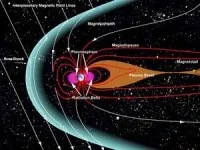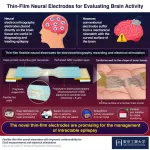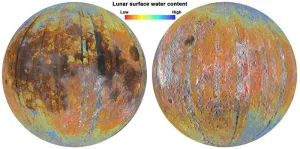(Press-News.org) UNIVERSITY PARK, Pa. — Rivers are warming and losing oxygen faster than oceans, according to a Penn State-led study published today (Sept. 14) in the journal Nature Climate Change. The study shows that of nearly 800 rivers, warming occurred in 87% and oxygen loss occurred in 70%.
The study also projects that within the next 70 years, river systems, especially in the American South, are likely to experience periods with such low levels of oxygen that the rivers could “induce acute death” for certain species of fish and threaten aquatic diversity at large.
“This is a wake-up call,” said Li Li, Penn State’s Isett Professor of Civil and Environmental Engineering and corresponding author on the paper. “We know that a warming climate has led to warming and oxygen loss in oceans, but did not expect this to happen in flowing, shallow rivers. This is the first study to take a comprehensive look at temperature change and deoxygenation rates in rivers — and what we found has significant implications for water quality and the health of aquatic ecosystems worldwide.”
The international research team used artificial intelligence and deep learning approaches to reconstruct historically sparce water quality data from nearly 800 rivers across the U.S. and central Europe. They found that rivers are warming up and deoxygenating faster than oceans, which could have serious implications for aquatic life — and the lives of humans. The National Oceanic and Atmospheric Administration estimates that most Americans reside within a mile of a river or stream.
“Riverine water temperature and dissolved oxygen levels are essential measures of water quality and ecosystem health,” said Wei Zhi, an assistant research professor in the Department of Civil and Environmental Engineering at Penn State and lead author of the study. “Yet they are poorly understood because they are hard to quantify due to the lack of consistent data across different rivers and the myriad of variables involved that can change oxygen levels in each watershed.”
The research team developed novel deep learning approaches to reconstruct consistent data to enable systematic comparison across different rivers, he explained.
“If you think about it, life in water relies on temperature and dissolved oxygen, the lifeline for all aquatic organisms,” said Li, who is also affiliated with Penn State’s Institute of Energy and the Environment. “We know that coastal areas, like the Gulf of Mexico, often have dead zones in the summer. What this study shows us is this could happen in rivers as well, because some rivers will no longer sustain life like before.”
She added that declining oxygen in rivers, or deoxygenation, also drives the emission of greenhouse gases and leads to the release of toxic metals.
To conduct their analysis, the researchers trained a computer model on a vast range of data — from annual precipitation rates to soil type to sunlight — for 580 rivers in the United States and 216 rivers in Central Europe. The model found that 87% of the rivers have been getting warmer in the past four decades and 70% have been losing oxygen.
The study revealed that urban rivers demonstrated the most rapid warming, whereas agricultural rivers experienced the slowest warming but fastest deoxygenation. They also used the model to forecast future rates and found that across all the rivers they studied, future deoxygenation rates were between 1.6 and 2.5 times higher than historical rates.
“The loss of oxygen in rivers is unexpected because we usually assume rivers do not lose oxygen as much as in big water bodies like lakes and oceans, but we found that rivers are rapidly losing oxygen,” Li said. “That was really alarming, because if the oxygen levels get low enough, it becomes dangerous for aquatic life.”
The model predicted that, within the next 70 years, certain species of fish could die out completely due to longer periods of low oxygen levels, which Li said would threaten aquatic diversity broadly.
“Rivers are essential for the survival of many species, including our own, but they have historically been overlooked as a mechanism for understanding our changing climate,” said Li. “This is our first real look at how rivers throughout the world are faring — and it’s disturbing.”
The other authors on the paper are Jiangtao Liu of Penn State and Christoph Klingler of the University of Natural Resources and Life Sciences in Vienna, Austria.
The Institute of Computation and Data Science at Penn State supported this research in part.
END
Rivers are rapidly warming, losing oxygen; aquatic life at risk, study finds
2023-09-14
ELSE PRESS RELEASES FROM THIS DATE:
London has the fastest increase in cooling demand in the world, shows new model
2023-09-14
A model to map energy demand down to street level shows cooling demand in the capital grew by 5% per year between 1980 and 2022 as summers heat up.
The Demand.ninja model, created by researchers at Imperial College London and TU Delft, was designed to show how the weather influences hourly energy consumption in buildings. It can also account for changes in demand as the climate changes, including the increase in cooling demand in the summer as heatwaves become more common and more intense.
Countries ...
New research signals a quantum leap for brain tumour treatment
2023-09-14
Researchers have discovered a new way to target and kill cancer cells in hard-to-treat brain tumours using electrically charged molecules to trigger self-destruction, that could be developed into a spray treatment used during surgery.
A multidisciplinary team of researchers from the University of Nottingham, led by the School of Pharmacy found a new way to harness the extraordinary capabilities of bio-nanoantennae—gold nanoparticles intricately coated with specialised redox active molecules to induce programmed cell death, or apoptosis, in cancer cells on electrical stimulation. The research ...
Use of physical therapy and subsequent falls among patients with dizziness
2023-09-14
About The Study: The findings of this study of 805,000 patients ages 18 or older suggest that receipt of physical therapy (PT) after presentation for dizziness was associated with a reduction in fall risk during the subsequent 12 months; thus, timely PT referral for dizziness may be beneficial for these patients. Future research, ideally with a clinical trial design, is needed to explore the independent impact of PT on subsequent falls for adults with dizziness.
Authors: Meredith E. Adams, M.D., M.S., of ...
Geographical variation in social determinants of female breast cancer mortality across US counties
2023-09-14
About The Study: The results of this study of 2,176 counties suggest that breast cancer mortality in the U.S. can be affected by where individuals live, and that more comprehensive and geographically targeted interventions may lead to healthier communities.
Authors: Taylor Anderson, Ph.D., of George Mason University in Fairfax, Virginia, is the corresponding author.
To access the embargoed study: Visit our For The Media website at this link https://media.jamanetwork.com/
(doi:10.1001/jamanetworkopen.2023.33618)
Editor’s Note: Please see the article for additional information, including other authors, author contributions ...
Combination immunotherapy treatment effective before lung cancer surgery
2023-09-14
Combination immunotherapy with the anti-PD-L1 monoclonal antibody durvalumab and other novel agents outperforms durvalumab alone in the neoadjuvant (pre-surgical) setting for early-stage non-small-cell lung cancer (NSCLC), according to researchers at The University of Texas MD Anderson Cancer Center.
The findings, published today in Cancer Discovery, were first presented at the American Association for Cancer Research (AACR) Annual Meeting 2022.
The multicenter, randomized Phase II NeoCOAST clinical trial evaluated neoadjuvant durvalumab alone ...
Verbal nonsense reveals limitations of AI chatbots
2023-09-14
NEW YORK – The era of artificial-intelligence chatbots that seem to understand and use language the way we humans do has begun. Under the hood, these chatbots use large language models, a particular kind of neural network. But a new study shows that large language models remain vulnerable to mistaking nonsense for natural language. To a team of researchers at Columbia University, it’s a flaw that might point toward ways to improve chatbot performance and help reveal how humans process language.
In a paper published online today in Nature Machine Intelligence, ...
Revolutionizing brain monitoring and stimulation with thin-film neural electrodes
2023-09-14
Flexible thin-film electrodes placed directly on brain tissue show promise for the diagnosis and treatment of epilepsy, as demonstrated recently by scientists at Tokyo Tech. Thanks to an innovative yet straightforward design, these durable electrodes accurately match the mechanical properties of brain tissue, leading to better performance during electrocorticography recordings and targeted neural stimulation.
Measuring brain activity is a useful technique for diagnosing epilepsy and other neuropsychiatric disorders. Among the several approaches adopted, electroencephalography (EEG) is the least invasive. During EEG recordings, electrodes ...
Researchers present novel principle for nitric oxide-mediated signalling in blood vessels
2023-09-14
Although a simple molecule, nitric oxide is an important signal substance that helps to reduce blood pressure by relaxing the blood vessels. But how it goes about doing this has long been unclear. Researchers at Karolinska Institutet in Sweden now present an entirely novel principle that challenges the Nobel Prize-winning hypothesis that the substance signals in its gaseous form. Their findings are presented in the journal Nature Chemical Biology.
That the simple molecule nitric oxide or nitrogen monoxide (NO) serves as a signal substance in many important physiological processes has been known for some time. For example, the discovery of the compound’s ...
Electrons from Earth may be forming water on the Moon
2023-09-14
A team of researchers, led by a University of Hawai‘i (UH) at Mānoa planetary scientist, discovered that high energy electrons in Earth’s plasma sheet are contributing to weathering processes on the Moon's surface and, importantly, the electrons may have aided the formation of water on the lunar surface. The study was published today in Nature Astronomy.
Understanding the concentrations and distributions of water on the Moon is critical to understanding its formation and evolution, and to providing water resources for future human exploration. The new ...
New tool can reveal inequitable distribution of ‘healing’ green spaces
2023-09-14
Areas in Vancouver with the greatest need for restorative nature often have the least exposure to it, according to a new UBC study published recently in Ambio. These neighbourhoods include Strathcona, downtown Vancouver, the West End, southern Sunset and Marpole.
The researchers developed a new tool, the local restorative nature (LRN) index to assess spaces for the presence of qualities that promote mental well-being. While initially applied in Vancouver, the index can also be used in any urban landscape, according to lead author Dr. Tahia Devisscher, an assistant professor in the faculty of forestry.
We sat down with Dr. Devisscher to discuss the study findings and ...






